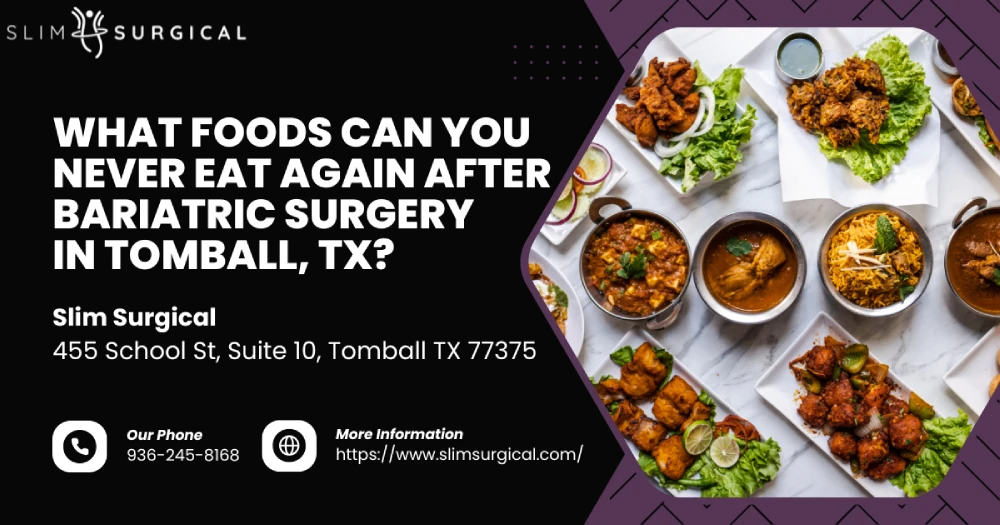
After undergoing bariatric or gastric surgery in Tomball, TX, whether you’ve chosen gastric bypass surgery or gastric sleeve surgery, your diet will experience a major transformation. These bariatric procedures are designed to help you lose weight, but they also come with unique dietary guidelines that are crucial for a safe recovery and long-term success. While it may take some getting used to, knowing which foods you can never eat again following bariatric surgery is essential. This permanent change will help prevent complications such as nausea, vomiting, hernia development, and dangerous metabolic reactions like dumping syndrome.
What foods can you never eat again after bariatric surgery in Tomball, TX? If you're preparing for gastric bypass surgery or gastric sleeve surgery, knowing which foods to permanently remove from your diet is critical. These changes are not temporary—they’re lifelong adjustments designed to help you lose weight safely and avoid complications such as dumping syndrome, nausea, vomiting, or hernia.
After bariatric surgery, your digestive system undergoes significant changes. Your new pouch is much smaller and more sensitive, and certain foods can trigger severe reactions or undo your weight-loss progress. To succeed long-term, it’s essential to understand what to eat, what to avoid, and why.
These types of surgery for weight loss, whether gastric bypass surgery, gastric sleeve surgery, or even lap band surgery, all reshape your digestive tract, creating a small pouch that holds less food. The surgical procedure for bariatric surgery is often done by making several small incisions and using small instruments and a camera to guide the surgery. This minimally invasive surgery is less traumatic and may allow patients to recover more quickly. Baylor Medicine and other leading healthcare providers emphasize that bariatric surgery may empty food into the small intestine too quickly, which is why you get full more quickly and can feel discomfort if you eat more food than you are used to eating.
After bariatric or gastric surgery, especially for patients who have undergone gastric bypass surgery or gastric sleeve surgery, your digestive system is dramatically altered. Major surgery results in a much smaller pouch, your body mass index decreases as you lose weight, and food bypasses portions of your small intestine. After any type of surgery or bariatric procedure, high-calorie liquids such as soda or fruit juice, high-fat foods, alcohol, and dense, hard-to-digest foods are simply too risky to keep in your regular diet.
Following bariatric procedures may make you more sensitive to certain foods, leading to new or heightened food intolerances, dehydration, pain, or even developing a hernia. The risks involved are not just discomfort; eating prohibited foods can result in severe complications such as blockages, uncontrolled vomiting, or emergency hospitalization. Understanding and following your doctor’s dietary instructions is crucial—if you’re unsure, work with a dietitian or consult your bariatric team in Tomball, TX without delay.
After your gastric bypass surgery or gastric sleeve surgery, your stomach can hold just a small amount of food. This means you feel full after eating much less than you did before your surgery. Food than you are used to will now get you full more quickly and may empty into the small intestine too quickly, causing dumping syndrome, pain, or other issues. Adapting to these changes takes time, and it’s important to understand the risks associated with bariatric surgery when consulting with Clifton Thomas MD who specializes in this field.
Dumping syndrome is a common complication related to gastric and bariatric procedures, characterized by symptoms such as diarrhea and making you feel faint or dizzy after consuming high-sugar or high-fat foods. This happens because food, especially high-calorie liquids such as soda, may empty into the small intestine too quickly, overwhelming your new digestive setup. Other intolerances include difficulty with tough meats, greasy foods, and foods prone to expanding in the pouch.
| Food Type | Why It's Off-Limits | Common Examples |
|---|---|---|
| High-Fat Foods | Increase risk for nausea, vomiting, slow weight loss progress, and can cause diarrhea. | Fried foods, bacon, sausage, full-fat cheese, creamy sauces |
| High-Sugar Foods & Drinks | Trigger dumping syndrome, cause diarrhea and make you feel faint. | Candy, soda, pastries, sweetened cereals, honey, syrup |
| Alcohol | Absorbed more quickly, risk for dehydration, increases calorie absorption. | Beer, wine, liquor, cocktails |
| Tough/Poorly Cooked Meats | Hard to digest, risk of blockage or nausea and vomiting. | Steak, pork chops, non-tender chicken breasts |
| Starchy Foods | Expand in stomach pouch, can get stuck, spike blood sugar, may require pain medicine. | White bread, pasta, rice, bagels, crackers |
| Carbonated Beverages | Create gas and bloating, increase feeling of discomfort. | Soda, sparkling water, beer |
High-fat and high-sugar foods are among the worst triggers for complications after gastric bypass surgery and gastric sleeve surgery. Consuming these foods not only jeopardizes your weight-loss success but also puts you at risk for dumping syndrome, diarrhea and make you feel sick, and sudden cravings that can make dietary adherence challenging. If you give in to old food habits, you may start craving foods that were a source of comfort before, but are now serious risks following bariatric surgery.
Instead, work with a dietitian to build a meal plan full of lean proteins, soft foods, whole grains, and vegetables that your new pouch can tolerate after the surgery. This change might take some getting used to, but it’s essential for your health and preventing complications related to your surgical procedure.
Sugary beverages and alcohol can derail your progress after weight loss surgery. Not only do they provide empty calories, but they also increase the risks associated with bariatric surgery, including dehydration, increased blood sugar, nausea or vomiting, and even impaired nutrient absorption. After gastric bypass surgery, you’ll often feel full after eating much less food, making high-calorie liquids such as soda or sweet tea even more damaging to your weight-loss efforts.
Choose water, decaffeinated teas, and sugar-free, non-carbonated beverages to avoid unwanted complications. Following the instructions about what to drink is key in the weeks after surgery and the month after surgery too—your pouch can be especially sensitive to sugar and carbonation during this time.
Getting enough protein is vital after gastric or bariatric surgery, but certain meats can be hard to digest in your new system. Tough meats increase the risks associated with bariatric procedures by making you sick with vomiting or leading to blockages that require medical intervention.
Safest protein choices include soft foods like ground turkey, moist chicken or fish, low-fat cottage cheese, and soft scrambled eggs. These are gentle on your new pouch and can help you feel full after eating much less.
Starchy foods such as white bread, pasta, rice, bagels, and pretzels can create a sticky mass in your pouch or even cause a blockage in your small intestine. This can result in pain, nausea, vomiting, and sometimes, serious complications related to general surgery. After weight-loss surgery, your pouch may be so small that even a minor obstruction can cause severe discomfort or require urgent medical attention.
Over time, your diet might allow for small amounts of whole grains, but only with the approval of your bariatric care team or after consulting with your gastric bypass surgeon.
Beyond the main offenders, there are other foods that commonly trigger complications following bariatric surgery. These include:
Every person’s tolerance post-surgery is different, so introduce foods slowly and pay attention to any signs of nausea, vomiting, or feeling faint.
Expert guidance is the foundation of a successful post-surgery journey. Clifton Thomas MD specializes in this field and has performed several bariatric procedures for patients in Tomball, TX and Harris County. Whether you've had a gastric sleeve surgery, gastric bypass surgery, or other common bariatric procedures, ongoing support will make your transition smoother and safer. Your bariatric team will provide specific instructions about what foods and drinks are allowed and when to reintroduce new items into your diet.
Patients stay in the hospital only a short time after minimally invasive surgery due to making several small incisions and using small instruments and a camera to guide the surgery. Blood tests and regular checkups are important to monitor for deficiencies or complications related to your type of surgery, as risks involved with bariatric surgery can evolve over time.
Before embarking on this journey, ensure you are an appropriate candidate for this surgery by checking your BMI and discussing other health factors with your nearest gastric surgeon or during a consultation with Clifton Thomas MD. Remember, there are always two bariatric risks to consider: surgical complications and long-term adherence to lifestyle changes such as regular exercise and proper diet.
Changing your eating habits after bariatric surgery in TX can help you lose 100 pounds or more, but only with dedication to the necessary dietary changes. Each type of bariatric procedure—be it gastric sleeve surgery, gastric bypass surgery, or another—requires giving up high-fat, high-sugar foods, starchy items, tough meats, sugary drinks, and alcohol for life. These adjustments are vital after surgery and what to consider when planning your weight-loss journey. Stay in touch with your bariatric team and work closely with a dietitian for the best chance at long-term success. With the right support from Clifton Thomas MD and your care team, you can embrace your new life with confidence, reclaim your health, and finally feel full after eating much less food than you are used to eating.
Yes. Foods high in fat, sugar, carbonation, or starch—as well as tough meats—should be permanently avoided. These foods can cause complications like nausea, vomiting, dumping syndrome, or weight regain. Your care team will provide a full list and help you build a new, safer diet.
Discomfort in the weeks after bariatric or gastric bypass surgery is common. The pouch and digestive tract need time to adapt, and eating too quickly or not chewing food thoroughly can cause nausea, vomiting, or pain. Slow reintroduction of foods, working with your dietitian, and following your surgeon's advice is vital.
Yes, some patients experience cravings for sweets, carbs, or greasy foods after bariatric procedures. However, giving in can lead to complications such as dumping syndrome and weight regain. Your care team can help you manage these cravings with healthy alternatives and behavioral strategies.
After gastric surgery, a dietitian provides personalized nutrition plans, ensures you receive adequate vitamins and protein, and helps prevent deficiencies. They also guide you through each dietary phase, helping you avoid foods that cause issues and ensuring your diet promotes healing and effective weight-loss.
Regular exercise is crucial post weight-loss surgery in Tomball, TX, as it supports ongoing weight-loss, improves mood, strengthens muscle mass, and helps prevent complications like blood clots. Combining appropriate exercise with dietary changes helps you reach and maintain your health goals long term.
Blood tests are routinely done after bariatric or gastric sleeve surgery to check for vitamin and mineral deficiencies. Since absorption changes after surgery, monitoring levels of iron, B12, vitamin D, and others is essential for preventing fatigue, anemia, and other complications related to nutrient deficiency.
Yes, risks associated with bariatric surgery include hernia and bowel obstruction, especially if dietary guidelines aren’t followed. Eating certain foods that get stuck or overfilling the pouch can increase these risks. Promptly report signs of pain, vomiting, or prolonged nausea to your bariatric care team.
Most bariatric procedures, including gastric bypass and sleeve surgery, are performed using minimally invasive techniques. These involve making several small incisions and using special instruments and a camera, which helps reduce pain, scarring, and recovery time for patients in Tomball, TX.
When consulting with Clifton Thomas MD or any bariatric specialist, discuss your BMI, health history, expectations, and readiness for lifestyle changes. Ask about the risks involved, recovery process, available procedures, and ongoing support to determine if you’re an appropriate candidate for this surgery.
Carbonated beverages like soda can stretch your new pouch, causing gas, bloating, and discomfort. The bubbles may lead to nausea and interfere with healing of the incision. It’s best to avoid all carbonated drinks after weight-loss surgery to protect your long-term results and comfort.

Start your journey toward health and confidence with Slim Surgical. Our expert surgeon is here to guide you every step of the way with advanced care tailored to your goals.

2025 Slim Surgical. All right reserved. Website Design & SEO By: Authority Solutions®